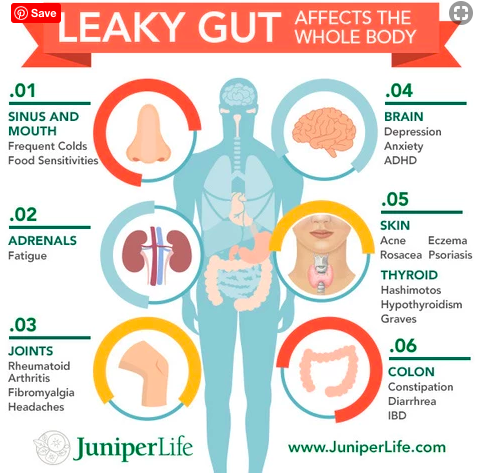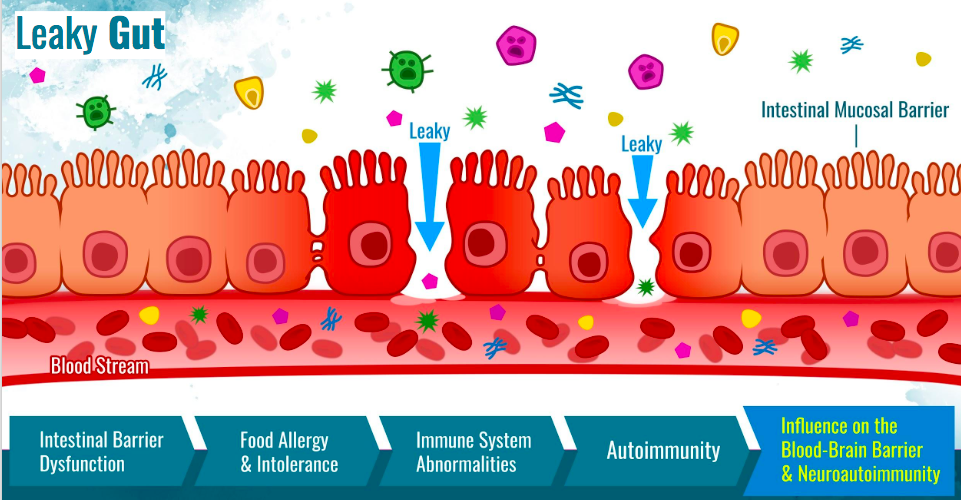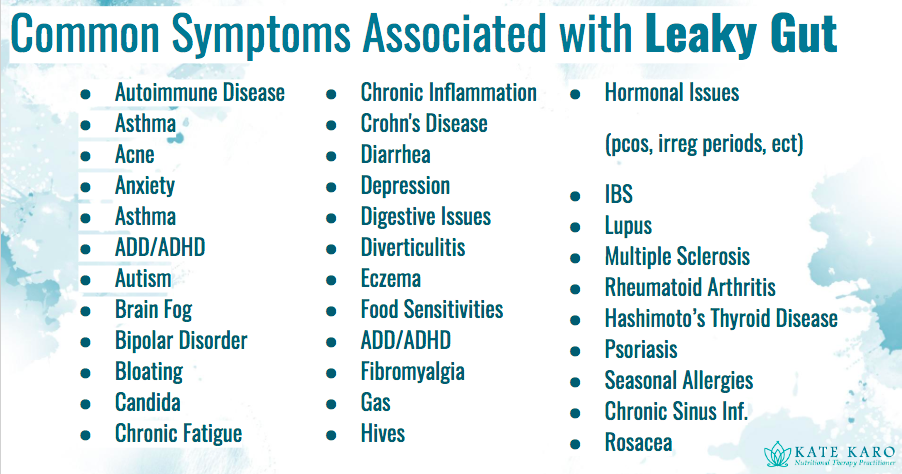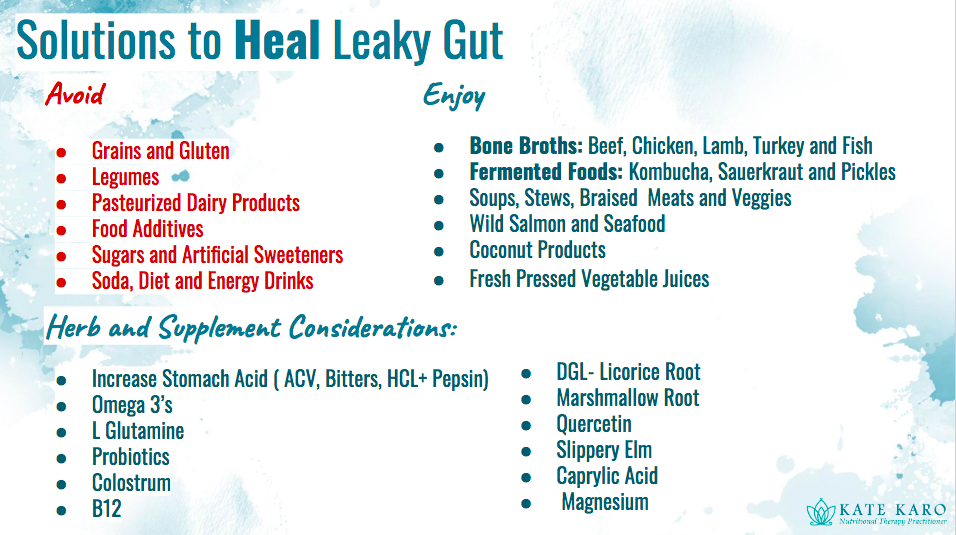Many of the health problems people are facing today are often seen to be influenced by chronic inflammation in the gut, which leads to breaking down of the gut lining, which then allows unwanted substances to slip through and cause an immune reaction. This may lead to many health problems i.e. food intolerances, autoimmune conditions, fatigue, cognitive and skin issues. Leaky Gut is more common than people may think. I’d estimate that 1/3 of people either have Leaky Gut, have had it or will have it… if not more, especially considering the S.A.D. (Standard American Diet).

How I found out I had Leaky Gut
I’ve been battling acne on and off for years so I decided to talk to my doctor about testing for food intolerances. I went to West Lake Medical Arts to see Dr. Womack; she is a functional medicine doctor and is Board Certified in Anti-Aging and Regenerative Medicine. She decided to do a food panel (IgG Elisa 184) which they needed a few vials of my blood for, then I just had to wait. Dr. Womack called me in about a week later to tell me that I had Leaky Gut. LEAKY GUT. Ewwww. It just sounds awful. This was the start of my healing journey.
What is Leaky Gut?
Leaky Gut is a common digestive system problem. Many people are living with this and don’t even know it. When your gut lining has become too permeable– aka intestinal hyperpermeability, things that should NOT go through your gut lining, DO.
“Tight junctions” is the technical term for what nutrients should go through while waste, toxins, and bacteria should not. My Food Panel showed I was allergic to a lot of the things that I was regularly eating. Which is one thing that points to a leaky gut, makes sense right? Partially digested food particles were getting through!

What causes Leaky Gut?
We all have some degree of leaky gut, as the gut lining isn’t completely impenetrable… it isn’t supposed to be either! From my understanding, the main thing that causes a leaky gut is GLUTEN. More specifically, gluten triggers the release of a protein called Zonulin that regulates intestinal permeability causing the tight junctions to loosen which in turn allows larger things to pass through ie. food particles, toxins, and bacteria.
There are other factors that play a role in causing leaky gut, here are a few that can contribute to a Leaky Gut:
- excessive intake of sugar and alcohol
- long term use of NSAIDs
- use of antibiotics which disrupt the normal gut flora
- toxin overload
- stress
- inflammation
- poor diet which leads to nutrient deficiencies
- poor gut health
- overgrowth of yeast
We already know that increased intestinal permeability plays a role in certain gastrointestinal conditions such as celiac disease, Crohn’s disease, and irritable bowel syndrome. The biggest question is whether or not a leaky gut may cause problems elsewhere in the body. Some studies show that leaky gut may be associated with other autoimmune diseases (lupus, type 1 diabetes, multiple sclerosis), chronic fatigue syndrome, fibromyalgia, arthritis, allergies, asthma, acne, obesity, and even mental illness. However, we do not yet have clinical studies in humans showing such a cause and effect. (1)
According to Dr. Leo Galland, director of the Foundation for Integrated Medicine, the following symptoms might be signs of leaky gut:
Chronic diarrhea, constipation, gas or bloating, nutritional deficiencies, poor immune system, headaches, brain fog, memory loss, excessive fatigue, skin rashes and problems such as acne, eczema or rosacea, cravings for sugar or carbs, arthritis or joint pain, depression, anxiety, ADD/ADHD, autoimmune diseases such as rheumatoid arthritis, lupus, celiac disease or crohn’s.

Healing my gut through DIET
I immediately cut out dairy, eggs, all gluten and grains, sugar, processed foods, and fruit. I was already caffeine and alcohol free. I had been flirting with a vegan lifestyle, so I decided to cut out meat as well but I still ate sardines and salmon each week, medicinally. I wasn’t eating anything that was raw either because raw foods are harder to digest and can have bacteria that could aggravate the system, so steamed and cooked ORGANIC veggies were my lively hood. Coconut oil can play an important part in healing the gut, too. It is important to give the digestive system a break, intermittent fasting with no snacking in between meals is recommended. I also do one 24 hour water fast each week and have recently tried a longer 3 day water fast, too.
Supplements to heal Leaky Gut
A typical leaky gut protocol involves many supplements… and lots of time.
L-Glutamine powder on an empty stomach, I do 5-10gs per day.
Probiotics, good quality ones. This is something I recommend you switch up every few months so you get different strains of good bacteria. I also supplemented with a prebiotic powder, which is food for the probiotics, or good bacteria.
Digestive Enzymes support the break down of food, absorption, and utilization of macronutrients. These are taken with every meal to aid with the body’s reduced supply of enzymes.
Betaine HCL promotes optimal gastric acidity for support of protein digestion and absorption of minerals and nutrients. Not everyone may need this one if you have lower stomach acid I’d definitely recommend getting some. Betaine HCL is taken mid-meal.
Collagen helps with the rebuilding of the gut. The amino acids in collagen are what are used to help close up the holes and “seal the leaks” by supporting cellular health and tissue regrowth.
Coconut Oil soothes and helps heal the stomach and intestinal lining. The saturated fats (lauric, capric and caprylic acids) present in coconut oil:
- anti-inflammatory
- anti-microbial
- help deal with various bacteria, fungi (including Candida), and parasites
- help with the absorption of nutrients in the gut
When buying coconut oil always get ORGANIC, extra virgin and cold-pressed.

As you can see Leaky Gut can happen to anyone. Eating organic whole foods, reducing environmental toxin exposure, calming the mind, limiting NSAIDS and antibiotics, while reducing sugar and alcohol intake will all be beneficial to your overall gut health. I hope this helps you to take care of your gut whether it is leaky or not. Our gut’s microbiome is more important than many people know!
- https://www.health.harvard.edu/blog/leaky-gut-what-is-it-and-what-does-it-mean-for-you-2017092212451

Recent Comments